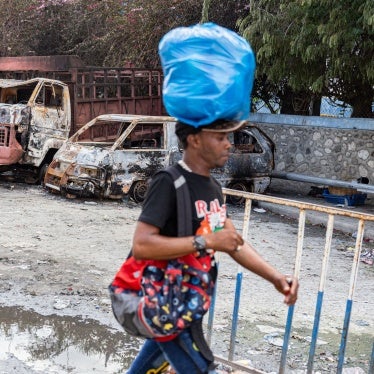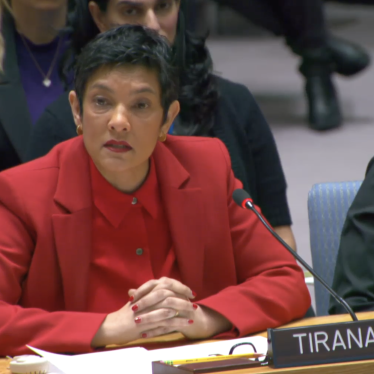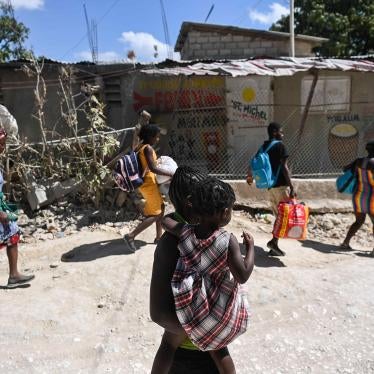The crisis in Haiti has reached a critical moment. Criminal groups that kill, rape, and kidnap at will are terrorizing residents, bringing transportation, health care, education, and the delivery of much-needed humanitarian assistance to a near standstill across much of the country. Urgent action is needed to restore basic security that will allow for the return of democratic governance so people can freely exercise their human rights and basic freedoms. That will also require the restoration of the rule of law and access to essential goods and services.
Between January and mid-March 2024, criminal groups killed nearly 1,500 people not involved in the violence and injured 800 others, according to the United Nations. Approximately 50,000 people have been internally displaced due to intensified attacks by these groups against key government facilities and residential neighborhoods previously considered safe. Ruthless acts of sexual violence, including gang rapes, continue to be reported. Nearly half of Haitians are acutely food insecure, and 1.4 million Haitians are at risk of famine according to the UN World Food Programme (WFP). Thousands of children are out of school, and criminal groups’ use and recruitment of children is increasing.
The state appears to be near collapse. Despite the efforts of the Haitian National Police, officers are overwhelmed and are unable to protect people. As a result, many Haitians face grave threats to their basic human rights, including the rights to life, health, food, water, and education, among others. A multinational security support mission, authorized by the UN Security Council in October 2023, has yet to deploy and still faces significant funding shortfalls.
Government leaders from the region and beyond – together with Haitian political party leaders and civil society representatives – have been holding urgent talks outside Haiti led by the Caribbean Community (CARICOM) to discuss the country’s future. On March 11, they announced their commitment to establish a Transitional Presidential Council, which would appoint a new prime minister, work with international partners for the accelerated deployment of the multinational security support mission, and eventually organize free and fair elections. Prime Minister Ariel Henry – who has not been able to return to Haiti since early March – announced that he will resign once the new presidential council is in place.
Other actors with ties to some of the most violent criminal groups have rejected the CARICOM initiative and are advocating a leadership role for Guy Philippe, the former police commander turned coup instigator who returned to Haiti in late November 2023 after serving six years in a US prison on money laundering and drug charges. Philippe has acknowledged having the support of some criminal group leaders and has even offered them amnesty if he takes power. Jimmy Chérizier (also known as Barbeque), the main leader of the G9 criminal coalition, which has claimed responsibility for recent attacks on state institutions, has also announced that he would not recognize any government “resulting of these meetings,” in reference to the CARICOM initiative.
These dynamics underscore the very real possibility that those responsible for the violence, tyranny, and human rights abuses against the Haitian people in recent years could assume control of the country in the coming days or weeks, if an alternative path forward is not given serious consideration and support.
The decisions that are made in the coming days could determine whether the situation in Haiti spirals even further out of control, setting the stage for more violence, abuse, hunger, corruption, and impunity, or whether the Haitian people will finally see a path forward toward democratic governance, basic security, the rule of law, and access to basic necessities. All of these are necessary for Haitians to be able to freely exercise and enjoy their human rights.
Recommendations:
To provide concrete support to the Haitian people, Human Rights Watch urges international, regional, and Haitian leaders to prioritize and fully implement the following six essential measures:
- United Nations Security Council members should keep their promise to the people of Haiti and urgently establish a UN-authorized security support mission with all necessary human rights safeguards.
Haiti’s authorities have repeatedly called for international action to address the country’s security crisis, and Prime Minister Henry specifically asked the UN to act. Many Haitians have also called for the international response to include a security component. The UN Security Council heeded these calls in October 2023, when it authorized a multinational security support mission and highlighted many dimensions of the crisis. Yet the mission has yet to deploy, as the security situation in Haiti has only deteriorated.
Security Council members should follow through on their commitment to Haiti. They should ensure that the mission they authorized is expeditiously provided with the necessary funding, personnel, and technical capacities to effectively support the Haitian National Police to help restore minimum security conditions and the functioning of the country’s critical infrastructure, including security for the new transitional government, while upholding human rights, as part of a broader response that addresses all dimensions of the crisis.
The Security Council should ensure that the mission includes rigorous human rights due diligence and human rights monitoring, which are essential to avoid repeating failures and abuses of past interventions in Haiti.
- Urgently establish a transitional government made up of leading Haitians who are not tarnished by credible allegations of corruption, support to criminal groups, human rights violations, or other serious crimes.
Concerned governments and Haitian groups participating in the discussions led by CARICOM should support vetting candidates for the new presidential council, including through a review of information available within the framework of sanctions regimes. They should take input from Haitian civil society representatives and human rights organizations seriously in the decision-making process.
Members of the new transitional government should establish a coercive mechanism to ensure that they will not participate in the coming elections, as agreed in the talks. They should work with partners to restore basic security and create an environment that will allow for the conduct of free, fair, and credible elections within a clearly defined timetable.
- Urgently provide the necessary resources to allow for the immediate and safe delivery of humanitarian aid to Haitians in need.
Despite the difficult environment, humanitarian organizations are still able to deliver life-saving assistance to many Haitians at risk of famine or who need urgent medical attention or other basic necessities. But these entities, including Haitian grassroots organizations, are quickly running out of resources. They need funding now to help keep people alive and cannot wait for a new transitional government or a security support mission.
- Assist Haiti in rebuilding its justice system in a rights-respecting way, prioritizing accountability for serious human rights abuses.
Among other steps, UN agencies and other international organizations should provide training and technical support to a specialized pool of Haitian judicial investigators, prosecutors, and judges who would focus on ensuring accountability for the most serious crimes committed by members of criminal groups and those supporting them.
The transitional government should work with the UN-authorized mission to put in place adequate security to allow for the resumption of judicial proceedings.
The transitional government should also prioritize ensuring that detention facilities are secure and humane and that criminal proceedings respect human rights. In particular, children who have been used or recruited by criminal groups should be provided with rehabilitation assistance, should not be detained with adults, and should receive juvenile justice safeguards. Assistance programs should be set up for victims of violence to provide them with access to justice, reparations, rehabilitation, and psychological support
5. Scale up efforts to stop the flow of weapons and ammunition into Haiti.
Concerned governments, in particular the United States, should promptly enforce the UN arms embargo on Haiti by increasing inspections at seaports and airports. Reports of violations of the arms embargo, with a special focus on transfers of small arms, should be reported to the UN Security Council’s Haiti sanctions committee, panel of experts, and other relevant bodies.
The Security Council should ask the sanctions committee to regularly map the illicit flow of weapons and ammunition to criminal groups in Haiti and update council members as often as necessary.
6. Don’t deport, return, or otherwise force people to go to Haiti.
No Haitians should be forcibly returned to the country as long as conditions in the country present a real risk of serious harm and human rights abuses. Such returns by Haiti’s neighbors amount to refoulement, a violation of international law.
***
The recent events highlight the urgent need for the international community to respond to the many dimensions of the crisis in Haiti in a holistic way that protects and upholds human rights. If fully implemented, these six steps could go a long way in overcoming the current crisis and breaking the cycles of violence, abuse, and harmful foreign interventions that have plagued the country for decades. Haitian leaders and concerned governments have an opportunity to get it right. What Haitians need now is principled engagement centered on their needs, and the necessary resources to carry out a rights-based, comprehensive response.






